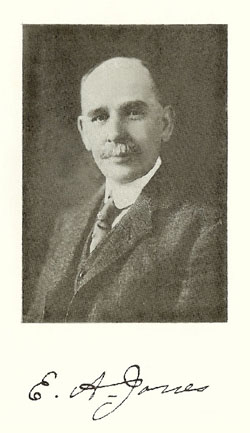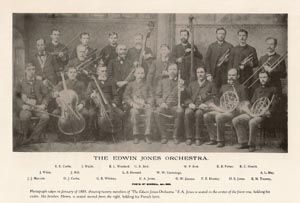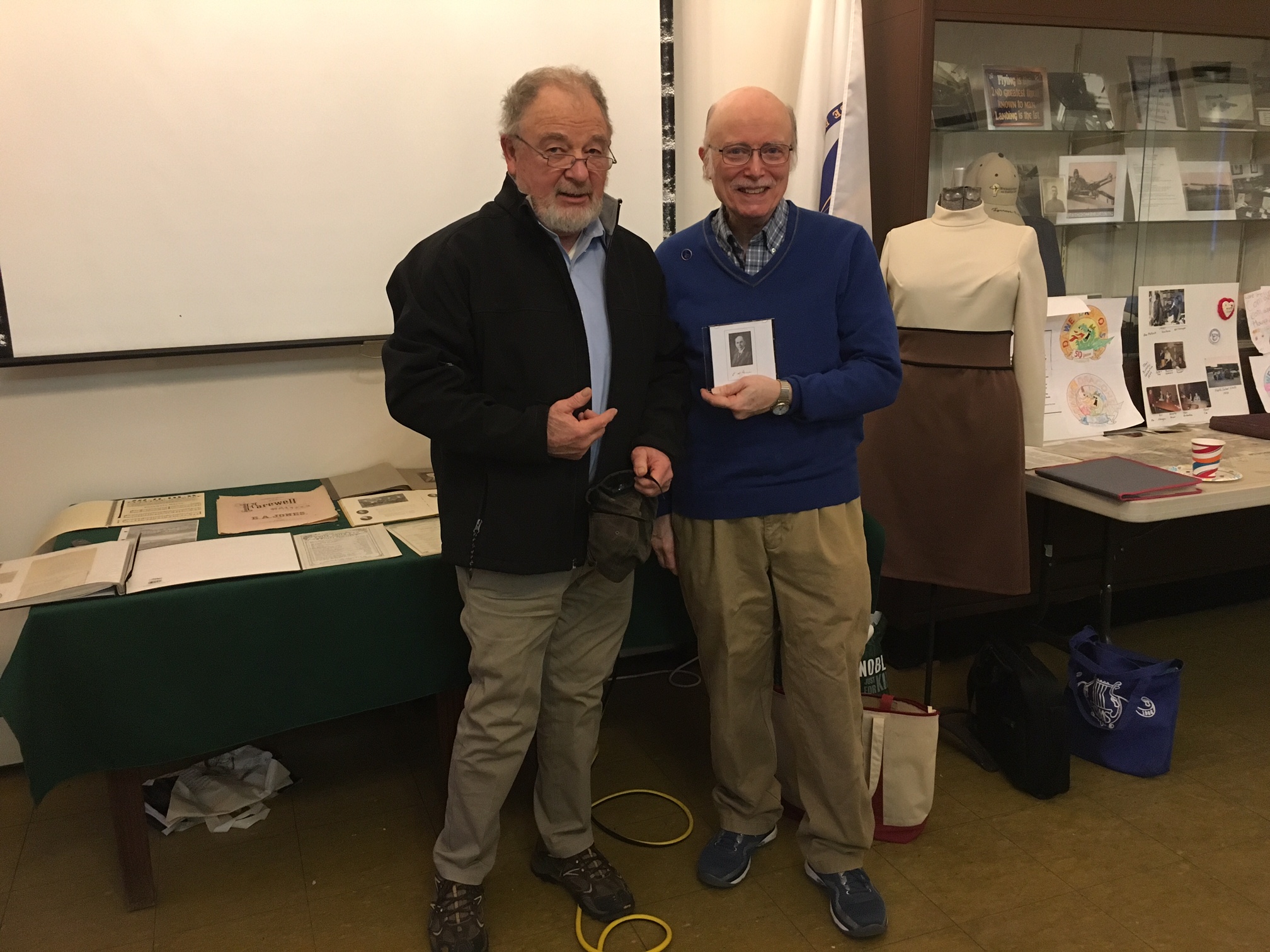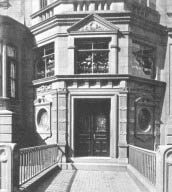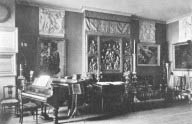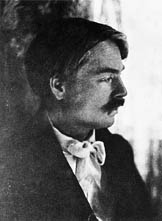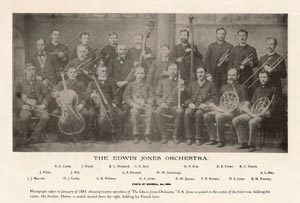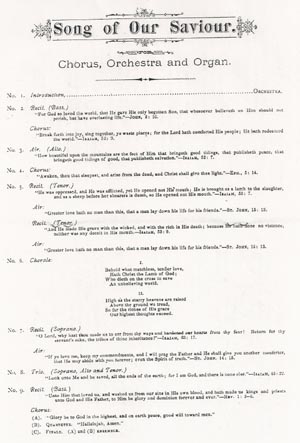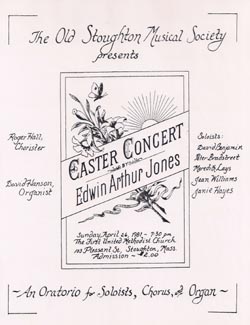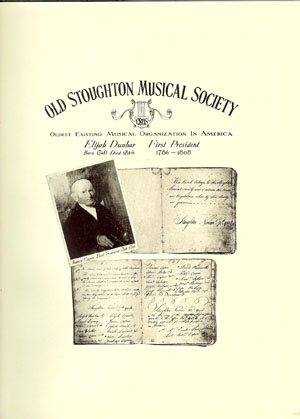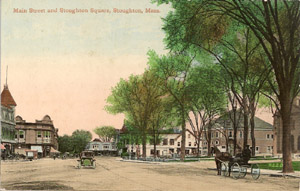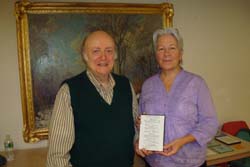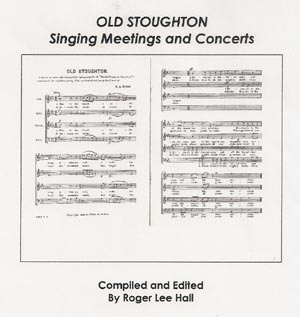
New England Composer Series No. 3
Edwin Arthur Jones (1853-1911)
- "one modest man who knows the power of music"
- List of music compositions
- String Quartet for Isabella Stewart Gardner in Boston
- CD: E.A. Jones: His Life and Music (interview and music examples)
- "Song of Our Saviour" - World Premiere Recording
- "Easter Concert" - Premiere of an Oratorio
- Stoughton's Two Musical Societies
- Praise From A Famous Boston Author
- DVD Collection
- Related Links
E.A. Jones --
"one modest man who knows the power of music"
B
His full name was Edwin Arthur Jones and he was born on June 28, 1853. His family lived at 9 (later 17) Pearl Street, across the street from Stoughton Town Hall. Unfortunately, the house was completely destroyed by a fire in 2003. His other home on Walnut Street still stands across the street from the Edwin A. Jones Early Childhood Center.
As Edward Everett Hale, author of "The Man Without A Country" wrote, E.A. Jones was "one modest man who knows the power of music."
E.A. Jones was one of Stoughton's most prominent citizens in the late 19th and early 20th centuries, involved with many town activities including the schools. His music was also heard frequently and appreciated by his fellow town citizens as well as in Boston.
Yet, when I first discovered all his manuscript music in 1980 at the Stoughton Historical Society, it was in a large brown package and had no identification on the outside as if if were just a pile of old newspapers. But instead, it was all the music by Jones in his own handwriting.
Over the years, I've been editing and getting his music performed, in many cases for the first time.
Is he unknown because he is not as well known a composer as Stephen Foster or Charles Ives? Or, is it because his name is so ordinary, sounding like a stodgy old New Englander? But his music is anything but stodgy. It is energetic and thrilling.
It seems he is ignored by academic scholars and music critics because he isn't well known today. But his music deserves to be heard before it is judged.
If you listen carefully to his music, you will hear a vibrant composer of his era.
A hundred years ago, Jones was one of Stoughton's best known citizens, mainly due to his town activities and his design of the Stoughton Town Seal, which features a harp designating the oldest choral musical society in the United States of America.
Jones graduated from Stoughton High School in 1869 at the age of only 15.
His music career began with studies at the New England Conservatory of Music in violin, organ and harmony.
Jones then entered Dartmouth College in 1872, where he was active in many activities. Like composer Charles Ives at Yale, Jones was active in sports and music. Jones was Captain of the baseball team, one of the editors of the college newspaper, and Director of the Dartmouth Glee Club. He graduated in 1876 as Class President. While attending Dartmouth College, Jones composed several exceptional glee club choruses for tenors and basses, including two from 1874: "Praise Ye the Lord" and "Blessing and Glory."
Both these choruses were performed in a concert in 1986 celebrating the bicentennial of the Old Stoughton Musical Society.In 1872, Jones was one of the violinists among the thousands of musicians who played in the famous World's Peace Jubilee and International Music Festival at Copley Square in Boston. The special invited guest at the Festival was Johann Strauss Jr. from Vienna, known as "The Waltz King."
After graduation from Dartmouth, Jones went to Baltimore to work in his parents' store. Following the inspiration of Strauss, his first major instrumental composition was a charming series of piano pieces titled, The Farewell Waltzes (Op. 8), published in Baltimore in 1874. The modern day premiere of these piano waltzes was given in 1986 at the Museum of Our National Heritage in Lexington, Massachusetts, performed by pianist, David Hagan.
Six years after the Farewell Waltzes, in 1880, his First String Quartet in F Major (Op. 13) was performed at the Peabody Conservatory of Music in Baltimore, where it was well received.A few years later he returned to Stoughton where he remained the rest of his life.
© 1984 - E.A. Jones: His Life and Music
In the 1880s, Jones formed his own orchestra [shown in the picture] in Stoughton and performed at many local plays and concerts.
The original Stoughton Public Library building is now the home of the the Stoughton Historical Society. The building was dedicated in 1904 when Jones was one of the Trustees of the Public Library and one of his choruses, "Hail! All Triumphant Lord," was performed at the dedication ceremonies in 1904. That chorus was played from a recording by the Old Stoughton Musical Society for the Centennial observance at the Stoughton Historical Society in 2004.
Among the many accomplishments of E.A. Jones was arranging for the Stoughton Musical Society to perform at the World's Columbian Exposition in Chicago in 1893. They were the only musical group to perform there representing early New England choral music. E.A. Jones led the orchestra in their two concerts at the Music Hall which were well received and more people attended their concerts than those for the symphony concerts.
Besides all these accomplishments, Jones was also a highly accomplished composer who wrote some magnificent compositions, especially his cantata (Song of Our Saviour) and oratorio (Easter Concert), and his String Quartet No. 2, first performed by the Kneisel Quartet in Mrs. J.L. (Isabella Stewart) Gardner's music room on Beacon Hill in Boston.
Jones was well respected in his time, not only in Stoughton but also by distinguished musicians in Boston like Benjamin J. Lang, who attended the premiere of the Jones oratorio in 1887 and spoke very highly about it.
Why should we be interested in the music of E.A. Jones today?
Because it is of such high quality and represents what a then rural 19th century composer could accomplish outside of a large city, like Boston.
Give his music a chance and you might be surprised how enjoyable it is to listen to.
-- Roger Hall, author of E.A. Jones: His Life and Music
After his PowerPoint program on February 9, 2020:
"E.A. Jones: Stoughton's Man of Music,"
Roger Hall presents his DVD-ROM with music by E.A. Jones,
for the Stoughton Historical Society library
to its President, Dwight MacKerronAlso discovered at that time
thanks to John Carabatsos of the Stoughton Historical Society
was the full orchestral score for EASTER CONCERT (1887)
read more about this score with listening examples -- click here
List of E.A. Jones music
compiled by Roger Hall
Op. 1: Duo for Two Violins (1871) - G Major
Op. 2a. Trios for Piano, Violin, and Bass - Key: G minor/ 2b. Key: G Major (1871)
Op. 3: For The Lord God Omnipotent Reigneth (TTBB)(1874) - C Major
Op. 4: Praise Ye The Lord (TTBB)(1874) - A Major
Op. 5: Heavenly Father, Hear Our Prayer (TTBB)(1874) - D Major
Op. 6: Blessing and Glory (TTBB)(1874) - Bb Major
Op. 7: Susan Brown (TTBB)(1874) - B Major
Op. 8a. The Farewell Waltzes - For Chamber Ensemble (1872)
Op. 8b. The Farewell Waltzes - Solo Piano in D Major (1874)
Op. 9a: God of Our Salvation, Hear Us (TTBB)(1875) - Ab Major
Op. 9b: God Of Our Salvation, Hear Us (TTBB)(1876) - Bb Major
Op. 10: Prelude and Fugue) in G minor for Organ (1878)
Op. 11: Supposing (Soprano and Piano)(1878) - E Major
Op. 12a. Trio for Violin, Viola, Cello - Air in the Style of Handel - D Major (1878)
Op. 12b. Trio for Strings - G Major (1878)
Op. 13: String Quartet No. 1 in F Major (1878)
Op. 14: Dedication March for Orchestra (1881) - D Major
Op. 15: Wake, Maiden Wake (TTBB) - published in 1881 - B Major
Op. 16: Song of Our Saviour - Cantata for Soloists, Chorus, Orchestra(1881)
Op. 17: Suite Ancienne for Orchestra in 3 movements (1886)
Op. 18: Old Stoughton (SATB) - published in Boston, 1886 - Eb Major
Op. 19: King Christian (Bass Solo and SATB)(1886) - Eb Major
Op. 20: Up the Hillside (SATB a cappella)(published in 1886) - C Major
Op. 21: Love is a Sickness Full of Woe (SATB a cappella)- G min
Op. 22: String Quartet No. 2 in G minor (1887)
Op. 23: Easter Anthem (SATB Soloists, Chorus, Orchestra)(1887) - Bb Major
Op. 24: Lament for String Quartet (1888) - G minor
Op. 25: Ode to Music (SATB Chorus a cappella)(1888)
Op. 26: Love Hailed a Little Maid (Soprano and Piano)(1888)
Op. 27: Snowflakes (Soprano and Piano)(1888)
Op. 28: Easter Concert - For SATB Soloists, Chorus, Piano (1890)
Op. 29: The Lord is King (SATB Chorus)(published in Boston, 1883) - F Major
Op. 30: Sing We To The Lord (Soprano Solo/ Chorus and Piano) (1884) - Bb Major
Op. 31: Lord God of Hosts (SATB Chorus and Piano) (1886)- C Major
Op. 32: Air with Variations for Piano - C Major
Op. 33: Club Waltzes for Piano - C and F Major
Op. 34: Duke of York (SATB Chorus a cappella) - G Major
Op. 35: Fugetta for String Quartet in Bb Major
Op. 36: Hail, Smiling Morn (Bass Solo and Chamber Ensemble) - D Major
Op. 37: Heavenly Father, Hear Our Prayer - Tenor and Soprano, SATB Chorus
Op. 38: Invocation and Benediction for Orchestra - F Major
Op. 39: Lament for String Quartet - D minor
Op. 40: Lord, Dismiss Us with Thy Blessing (SATB Chorus a cappella) - D Major
Op. 41: Lochinvar Overture for Orchestra - Bb Major
Op. 42: Minuet and Trio for String Trio - G Major
Op. 43: There's a Land Immortal (SATB Chorus a cappella) - E Major
Op. 44: God Bless Our Native Land (SATB Quartet and Piano)(1900) - Eb Major (composed for the new century)
String Quartet For Isabella Stewart Gardner
[The Gardner residence at 152 Beacon Street
in Boston, Massachusetts]One of the proudest moments for Jones was when his Second String Quartet titled, Prelude and Fugue in G minor, was first performed on February 28, 1889 by the most respected chamber music ensemble of its day, the Kneisel Quartet. A recording of this String Quartet, performed by The Cremona Quartet is available on the AMRC CD, "Great God of Nations: Music by E.A. Jones."
It was part of a series sponsored by the Manuscript Club and performed in the music room of John Lowell Gardner's five floor townhouse at 152 Beacon Street. The Jones string quartet is dedicated to Mrs. J. L. (Isabella Stewart) Gardner.
Other composers also represented in that 1889 concert program at the Gardner home were: Clayton Johns, Margaret Ruthven Lang, Edward MacDowell [shown at left] and Horatio Parker. All of them autographed the concert program for Mrs. Gardner (a copy of the program is in the New England Music Archive). The music titles for this concert are listed in Morris Carter's 1925 book, Isabella Stewart Gardner and Fenway Court.
Now available on a CD titled:
"Great God of Nations" - Life and Music of E.A. Jones (AMRC 0008)
with over an hour
of music performed by vocal soloists and chorus
of The Old Stoughton Musical Society,
conducted by Roger Hall and Earl Eyrich,
plus an interview from 1980
with two women who were related or actually met E.A. Jones.
To order your copy of this CD about music from
Stoughton's most accomplished 19th century composer,
go to the American Music Recordings Collection -- click here
World Premiere Recording
of a Cantata
Completed in 1881, the dramatic cantata, Song of Our Saviour (Op. 14), was the crowning achievement for E.A. Jones and a work that deserves to be heard more often.
This cantata was discovered along with other music by Jones at the Stoughton Historical Society in 1980 by musicologist, Roger Hall, who has written a short biography titled: E.A. Jones: His Life and Music
The cantata was revised from an earlier choral work, The Nativity Hymn, one of only four works to receive honorable mention in 1879 in the Cincinnati College of Music competition, judged by Theodore Thomas, the most distinguished conductor in America at that time.Song of Our Saviour was composed for SATB soloists, chorus, organ and orchestra.
It received its World Premiere performance over one hundred years after its completion on May 3, 1992, with four soloists, organist Richard W. Hill, and the Old Stoughton Musical Society Chorus and Orchestra, conducted by Dr. Raymond Fahrner, who also edited and prepared the orchestration for the cantata.
There was an article written about this World Premiere performance in The Boston Globe newspaper, "Giving life to E.A. Jones' lost masterpiece," on May 4, 1992.
Here are a few listening samples (for streaming only):
Alto Air: "How beautiful upon the mountains" (Isaiah 52:7)
Chorale: "Behold what matchless tender love"Trio: "Look unto Me and be saved" (Isaiah 45:22)
The complete cantata from the World Premiere performance in 1992 is now available on AMRC CD 0029 -- click here.
Premiere Performances of an Oratorio
The second major choral work by Jones was his oratorio, Easter Concert (Op. 28), published in a piano-vocal score by White-Smith Music in Boston, Massachusetts
in 1890.Jones was a friend of one of Boston's most respected musicians, B.J. Lang, who attended the first performance of the oratorio, then titled Easter Anthem (Op. 23), in Stoughton on April 11, 1887. Lang spoke briefly at the intermission and called the oratorio "a beautiful and grand affair." He went on to say that he wished he could transport the whole chorus and orchestra of 150 members to his city twenty miles away, "to give the people of Boston an idea of what Stoughton could do!"
Easter Concert was modeled on Handel's Messiah and is in three sections, ending with a majestic finale, "Great God of Nations," for vocal quartet and chorus.
The first modern day performance of this Jones oratorio, edited and conducted by
Roger Hall, was performed on April 26, 1981 by the Old Stoughton Musical Society.The 80 minute oratorio was performed again in 1984. Both performances were from the piano-vocal score.
The May 6, 1984 performance is now available on a CD (AMRC 0030).
To hear music samples from this oratorio -- click here
Stoughton's Two Musical Societies
Jones was a member of both choral societies in town:
The Stoughton Musical Society -- founded in 1786 and now the oldest choral society in the United States. Jones joined this society in 1871. In 1908 it was officially incorporated in the Commonwealth of Massachusetts as The Old Stoughton Musical Society (or OSMS).
The Musical Society in Stoughton --founded in 1802 and only open to town residents. Jones joined in 1881. This musical society (MSIS) was disbanded in 1982.For the Stoughton Musical Society Centennial in 1886, Jones was the lead violinist and director of the orchestra. Also that year, he composed a special commemorative chorus for The Musical Society in Stoughton, in the style of 18th century New England music, and he titled his chorus: "OLD STOUGHTON."
Life Summary
Jones held a weekly "musicale" of chamber music with his musician friends at his Stoughton home, performing chamber music by Mozart, Mendelssohn and other composers.
Besides his musical activities, he was also remembered for his civic leadership as School Committee member for fifteen years, Trustee of the Stoughton Public Library, President of the Fortnightly Club, and Secretary of the Chicataubut Club.
He was also President of the Stoughton Musical Society (1902-1904) and its Secretary (1894-1901/1906-1910).
In 1892, Jones designed the Stoughton Town Seal -- possibly the only one in the United States with a historical music symbol -- a harp honoring the oldest choral society in the U.S.A.
Because of his considerable dedication on the School Committee, a school in Stoughton was named after him, located across the street from where he lived at the corner of Pierce and Walnut Streets.
Edwin Arthur Jones died suddenly of a heart attack on January 9, 1911, at the age of 57.
Praise From A Famous Boston Author
The distinguished writer and clergyman, Edward Everett Hale (1822-1909), wrote the following description of a Sunday concert led by Edwin Arthur Jones:
For two hours an orchestra, such as he had seldom heard, rendered with dignity and feeling some of the best music of the noblest composers...more than fifty years ago the musical society of this village was gathered and incorporated. That has probably helped in building up the taste of this town. But in our generation one modest man who knows the power of music has organized this grand orchestra.
Nobody pays them, nobody pays him, except the good God. ..This man was the leader, whom you saw. If he had not been too modest, you would have heard one of his own compositions. I dare say you have heard them in New York or in Cincinnati. I wanted you to see this, so soon as you asked what was possible in a community of five hundred people.
He then explained what his fictional description was based on:
I have here attempted to describe the interesting musical service which is carried on in the town of Stoughton, in Norfolk County, in Massachusetts ...I have but described in this chapter, as well as I can, the service which the people of this town render regularly under the leadership of Mr. Edward [Edwin] Jones.
-- Mr. Tangier's Vacations (Boston, 1888), pages 45-46.
DVD Collection
"How Beautiful Upon The Mountains" -
Music by Edwin Arthur Jones
Included on this extensive collection are
the booklet about his life and music,
two audio albums with his music
including his two major choral works:
"Song Of Our Saviour" (1881)
"Easter Concert"(1890)
In addition there are two video programs:
"Centennial Tribute to E.A. Jones" in 1987
"150th Birthday Party" at the Stoughton Historical Society in 2003
This multimedia DVD-ROM or USB with documents, audio and video files is available for just $19.95 (USA orders only, shipping cost included).
For orders in countries other than the USA, click the "Add to Cart" TWO TIMES for $39.90 (Air Mail shipping included).
Important!
After you have ordered the book, send your email address
to confirm your order and indicate if you wish DVD-ROM or USB
To send your mailing address -- click here
Anniversary Program Tribute
Jones biographer, Roger Hall, spoke about the Jones String Quartet No. 2 in G minor, dedicated to Isabella Stewart Gardner and first performed on February 28, 1889 in the music room [shown at right] of her home at 152 Beacon Street in Boston.
A recording of this string quartet performed by The Cremona Quartet was played as part of the Stoughton Reads Together series on the Gardner Museum Art Heist, and presented in the Wales French Room of the Stoughton Public Library,Thursday, April 28, 2011.
After the program, Roger Hall presented his new DVD collection titled, NEW ENGLAND MUSIC SAMPLER, which includes the Jones string quartet and other music by E.A. Jones, to Stoughton Library Director, Pat Basler.
The information on this page was compiled from the following sources by E.A. Jones biographer, Roger Hall:
- E.A. Jones: His Life and Music (1984)
- Dedication" - Singing in Stoughton, 1762-1992
- Jones, Edwin Arthur" in
The New Grove Dictionary of American Music, Volume Two (1986)
- Music in Stoughton: A Brief Survey (1989)
- Ten Town Tunes: Music From Stoughton (1998)

Related Links
"Dedication" - Singing Meetings and Concerts, 1762-1992
Wikipedia article: Edwin Arthur Jones
World's Columbian Exposition Concerts - Chicago, 1893
© 2011/ Updated: 2023 PineTree Productions. All Rights Reserved. Contact: pinetreepro@aol.com




